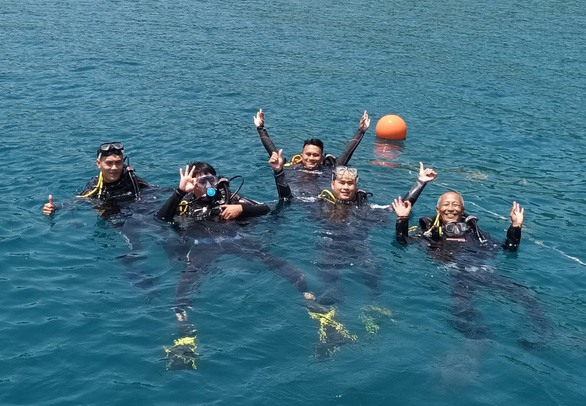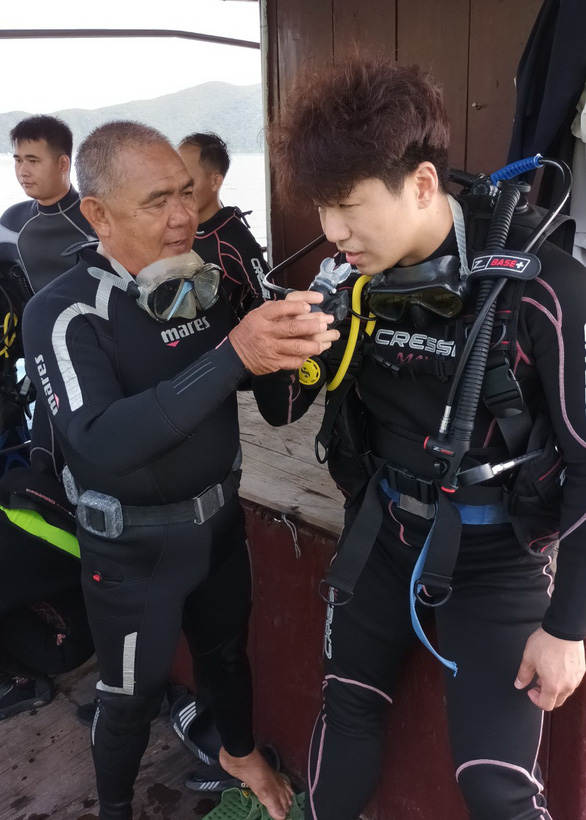Nguyen Van Loc and Nguyen Tan Thanh are members of the Professional Association of Diving Instructors (PADI).
With certificates of diving competence, they are qualified to provide PADI-accredited diving courses.
Twenty years ago, Loc had a life-changing experience diving with a foreign visitor in Hon Mun Marine Reserve, Khanh Hoa Province.
The coach spotted an unsuspecting squid, which he grabbed and later cooked it.
To this his foreign student objected, saying that the payment he made was for him to witness wildlife, not the barbaric habits of his coach.
“If you catch and cook it, you get one meal for yourself. But if you take care of it, you are to be commended to my fellows back home,” said the student.
“When more tourists come here for that value, your income will remain constant.”
At that time, Loc was working for a French employer who majored in diving trips for European travelers in Nha Trang Bay.
The seabed of Hon Mun Marine Reserve is home to a type of large-sized lamprey, which was a daily sight for divers here, guided by Loc himself.
Now over 60, Loc is a world-class diving instructor and his students come from all over the world.
“A woman from Hong Kong came here last week and got her certificate,” said Loc.
|
|
| A group of tourists are pictured on their diving trip in Hon Mun Marine Reserve, Khanh Hoa Province, Vietnam. |
“This morning, I had my first session with a Korean tourist. He will be certified in a few days, then he will be eligible to dive anywhere in the world.”
The Korean man was Donggi Hong, a diving enthusiast who learned about Loc’s service from the Internet.
“I stayed four days just to get the diving certificate, after which I will return to Korea,” said Donggi.
“Next year, I will take my whole family back here on our vacation.
“We will dive and admire the beauty of the corals and the amazing underwater life.”
As the diving boat carrying both Loc and Thanh’s students was properly anchored within Hon Mun Marine Reserve, Loc took his Korean student in the water first.
Loc and his student went on a diving trip to Hon Mun with coach Nguyen Tan Thanh, who was in charge of a team from Hanoi.
“You have to stick to the white waters near the island. We will practice there,” said Thanh.
“During the dive, please signal your safety with your hand gestures.”
Deep in the sea, the coach was on his knees and relied on his body language, pointing at the goggles, the pipes, and the pneumatic gauge as a way of giving instructions.
“They were surrounded with swarms of palm-sized fish and smaller ones, all of different colors,” he continued.
“I saw a half-meter-long barracuda swiftly attack a fish the size of three grown-man fingers.
“The fish in this body of water are quite familiar with tourists, so they do not experience a sense of turbulence and do not break out in all directions at the sight of human divers.”
One of the divers had to dash to the surface, prompting Thanh to follow for a safety check.
The student, fortunately, simply needed to empty seawater out of his goggles.
After a 40-minute practice round, the whole class headed back to the boat for a resting period.
“Yesterday we learned the basic skills necessary for in-pool situations. Please implement them and attempt to fix simple mechanical problems [as we get under the sea],” said the coach.
“You will begin to dive away only on our second meeting. We will have to watch out for each other to double check our equipment and help each other out.
“Tomorrow we will dive 20 meters below and will solve more complicated problems ourselves.”
During his dive, Donggi posted a picture of himself in Hon Mun Marine Reserve on a social network.
Loc was dictating to himself while writing his notes down on a small-sized plastic chalkboard.
This proved understandable for Donggi.
“This Korean man did not have a good command of English, so I had to use the board to make my ideas clear,” Thanh said.
“It is much more tiring working with foreigners than working alongside our Vietnamese fellows.
“In return, they will make references for us.”
There are two numeral codes on the certificate: the student code and the diver code, Loc informed.
“Once you have obtained this certificate, you will be eligible to dive anywhere in the world.”
The certificate can only be issued when students have passed the course and will be withheld from those who cannot perform the required skills.
|
|
| Donggi Hong (right) is a Korean tourist who came to Vietnam for his diving lessons and certificate. |
Over the last 20 years, Thanh has provided lessons for over a thousand people, mostly domestic and foreign tourists.
“Many of my Western students have set up their own diving tours,” said Thanh.
Protecting the marine life
Loc and Thanh both started working in the salvage service. They frequented the seas along central Vietnam and even salvaged shipwrecks.
After that, they were employed by Jean Pier, a French tour operator for divers in Nha Trang.
“People did not have the faintest idea what diving in Nha Trang would be like,” Thanh recalled.
“Jean Pier operated diving tours for European visitors to Nha Trang. He educated us about the preservation and the value of coral ecosystems.”
From Thanh’s accounts, Pier once purchased a freshly caught turtle from local fishermen at the price of roughly US$10.
The turtle was released, and Thanh got to learn from Pier about the biological and food chain in the ocean.
They began to understand the ocean is the bread and butter of tourism.
Nha Trang tourism services used to apply a strike quick approach to their businesses.
They received zero training in the services and their communication to visitors was displeasing.
“I was in charge of three American divers. Noticing such eye-catching corals and fish, one of them left the group for his own expedition,” said Thanh.
“On board! Now! That’s too dangerous. You may die!” Thanh shouted at the American man on that trip.
To this the man replied: “You were right to remind me, but your attitude was not appropriate. Remember that tourism is a customer service industry. You have to be polite and gentle in your words and your actions.”
“Later when I opened up my own business, I stuck to his words and emphasized ocean life preservation,” said Thanh.
“I make sure my employees are well aware of these lessons.”
Giving salvage lessons to the military
According to Loc, the High Command of Ho Chi Minh City sent four officials on a diving lesson trip to Nha Trang, where they would practice diving and honing their salvaging skills.
“For each salvage course, I had to be the coach and I asked PADI to provide four certificates, qualifying people in basic diving, advanced diving, on-land first aid, and salvage,” said Loc.
“A qualified salvage officer can dive up to 30 meters in depth and is able to navigate in the sea using a dive compass.”
Maintaining the spirit of the sea
Hon Mun Marine Reserve was established in 2001.
The seabed here is filled with coral reefs and a variety of marine creatures.
It is an ideal place for scientific work, best for sea animal researchers, oceanographers, and tourists yearning to learn about the sea.
“The sea creatures and coral reefs are always under strict supervision,” said Vo Si Tuan, associate professor and former head of the Nha Trang oceanography center.
“It is the spirit of the reserve and a huge source of funding for the development of tourism.”
Like us on Facebook or follow us on Twitter to get the latest news about Vietnam!
Diving for Pearl Oysters on Tam Islet
Tam Islet is one of the four most beautiful islets in Nha Trang with a diverse maritime eco-system. The islet is an ideal place for swimming and diving to behold colourful coral reefs and see pearl oysters which are raised in the sea. Recently, the Provincial People’s Committee of Khanh Hoa instructed the Giang Gia Pearl Company and the Hon Tam Tourists Area to organize dive tours for pearl oysters.











